Young Americans’ attitudes are as favorable toward the Palestinian people and government as toward Israel

In recent years, U.S. public opinion has become modestly more positive toward both sides in the Israel-Palestinian conflict, according to a new Pew Research Center survey.
Overall, Americans continue to express more positive feelings toward the Israeli people than toward the Palestinian people – and to rate the Israeli government more favorably than the Palestinian government.
But these gaps are much larger among older Americans than among younger ones. Indeed, U.S. adults under 30 view the Palestinian people at least as warmly (61% very or somewhat favorable) as the Israeli people (56%) and rate the Palestinian government as favorably (35%) as the Israeli government (34%).
The new survey, conducted March 7-13 among 10,441 U.S. adults, also shows that public opinion varies considerably on these questions by political party. Republicans and those who lean toward the Republican Party express much more positive views of the Israeli people (78% very or somewhat favorable) than of the Palestinian people (37%), and they view the Israeli government far more favorably (66%) than the Palestinian government (18%).
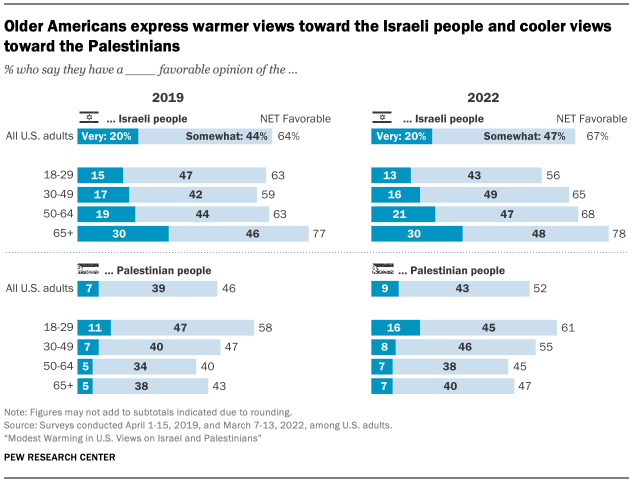
By contrast, Democrats and Democratic-leaning independents hold about equally positive views of the Israeli people and Palestinian people (60% and 64% favorable, respectively) and rate Israel’s government on par with the Palestinian government (34% vs. 37%).
Among both Republicans and Democrats, feelings toward the Israeli and Palestinian governments and the Palestinian people have warmed slightly since 2019, while views of the Israeli people have held steady.
Nearly three-quarters of a century after the founding of the modern state of Israel, the survey finds no clear consensus among Americans about the best possible outcome of the conflict between Israel and the Palestinians.
About one-third of the public says splitting the land into two countries – a version of the “two-state solution” long backed by U.S. diplomacy – would be best (35%). But roughly a quarter (27%) would prefer to see a single state emerge, in most cases with a government comprised jointly of Israelis and Palestinians. And more than a third of U.S. adults (37%) say they are not sure what is the best outcome.
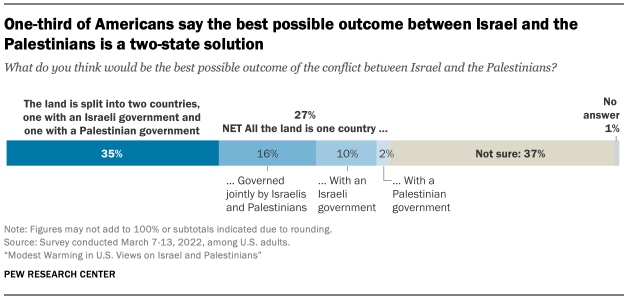
Age is a factor in these opinions: Older Americans are more inclined than younger ones to say that a two-state solution would be the best possible outcome of the conflict, while adults under 30 are more likely than their elders to say they aren’t sure what’s best.
Religious affiliation also matters: White evangelical Protestants are much more likely than members of any other major Christian tradition to say the best outcome would be a single state with an Israeli government; 28% say this, compared with 6% each of Catholics, White non-evangelical Protestants and Black Protestants.
Perhaps relatedly, White evangelicals also are the group most likely to say God gave the land that is now Israel to the Jewish people. Fully 70% of White evangelicals take that position, more than twice the share of U.S. Jews who answered a similar (but not identical) question in a 2020 survey by saying God gave the land of Israel to the Jewish people (32%).
The new survey also asked the U.S. public about the boycott, divestment and sanctions (BDS) movement against Israel. Relatively few Americans know about this boycott effort; 84% say they have heard “not much” or “nothing at all” about it. Just 5% of U.S. adults have heard at least “some” about BDS and express support for it, including 2% who strongly support it.
The survey was conducted among Americans of all religious backgrounds, including Jews, Muslims, Buddhists and Hindus, but it did not obtain enough respondents from non-Christian religious groups to report separately on their responses. U.S. Jews’ views toward Israel were explored in depth in Pew Research Center’s report “Jewish Americans in 2020” (though that survey did not include a question about the best possible outcome of the conflict).
Americans overall view Israeli people more favorably than Palestinians
Two-thirds of Americans express at least a somewhat favorable view of the Israeli people, including one-in-five who say they feel very favorably toward the Israelis. Opinion about the Palestinian people is somewhat cooler: 52% of the public has a favorable view, and one-in-ten U.S. adults have a very favorable opinion of the Palestinians.
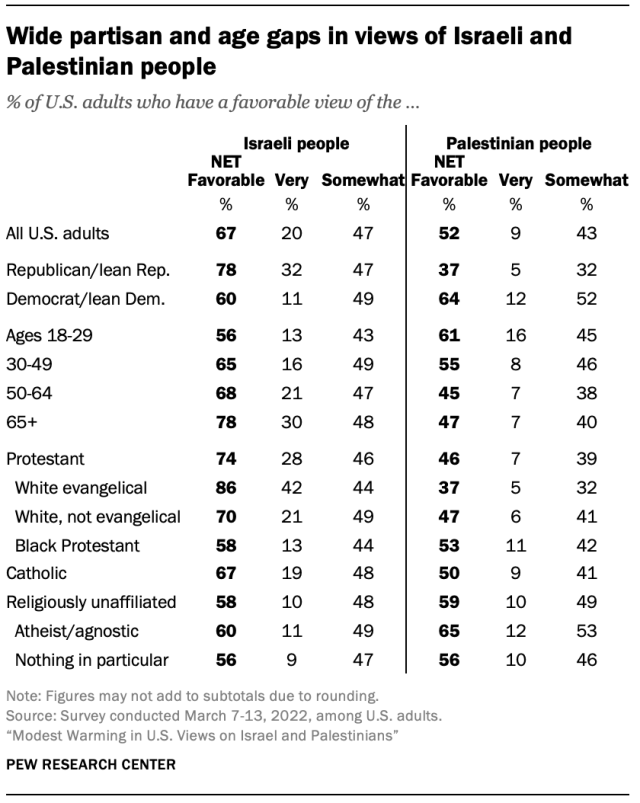
Republicans and those who lean to the GOP are much more likely to express a favorable view of the Israeli people (78%) than of the Palestinian people (37%). Among Democrats and Democratic leaners, on the other hand, similar shares express favorable views toward both groups (60% and 64%, respectively).
Compared with their elders, younger U.S. adults tend to express cooler views toward the Israeli people and warmer views toward the Palestinians. For example, 56% of adults under 30 say they feel favorably toward the Israeli people, compared with 78% among those ages 65 and older. And a solid majority of those ages 18 to 29 (61%) express favorable views toward the Palestinians, compared with 46% of those 50 and older.
Nearly nine-in-ten White evangelical Protestants have a favorable view of the Israeli people (86%), including 42% who say they have a very favorable view. But White evangelical Protestants are among the least likely subgroups to say they have a favorable view of the Palestinian people (37%). By contrast, religiously unaffiliated Americans – adults who describe themselves, religiously, as atheist, agnostic or “nothing in particular” – express similarly positive views toward both the Israeli people and Palestinian people (58% and 59%).
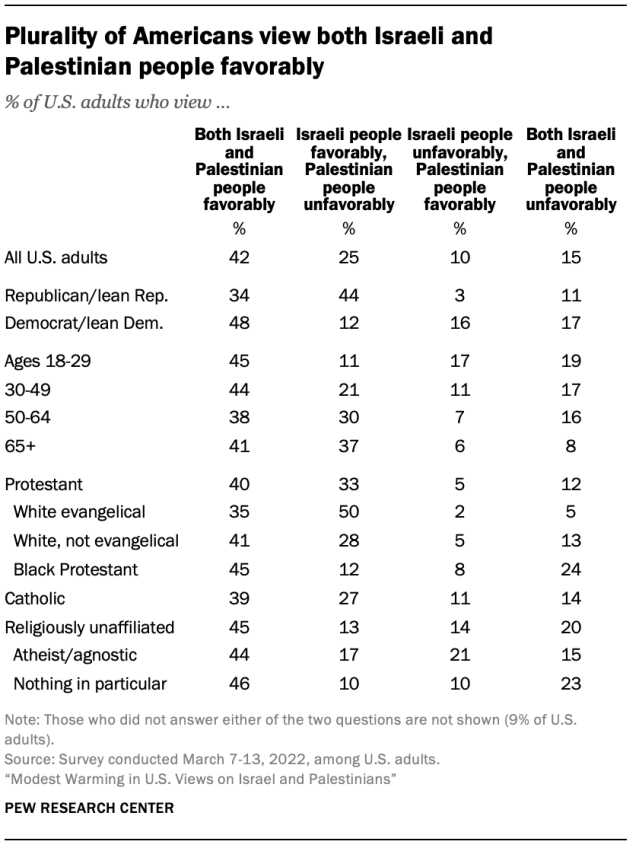
Putting these two questions together, a plurality of U.S. adults (42%) view both the Israeli people and Palestinian people favorably, while 15% express unfavorable views of both groups. An additional quarter see the Israeli people favorably and the Palestinian people unfavorably, and one-in-ten view the Palestinian people favorably and the Israeli people unfavorably.
Roughly half of Democrats view both groups favorably, compared with 34% of Republicans. Republicans are far more likely than Democrats to view the Israeli people favorably and the Palestinian people unfavorably (44% vs. 12%). White evangelical Protestants, a heavily Republican group, are more likely to view the Israeli people favorably and the Palestinian people unfavorably than any other combination of responses.
Adults under 30 are more inclined than older Americans to view the Israeli people unfavorably but the Palestinians favorably.
When asked about their views of the Israeli government, about half of the U.S. public (48%) expresses a very or somewhat positive view, compared with 28% who view the Palestinian government favorably.
The survey did not define “Palestinian government” for respondents. Much of the West Bank continues to be administered by the Palestinian Authority, under the leadership of Mahmoud Abbas, while Gaza has been governed by Hamas since 2007.
As with views toward the Israeli people, young adults are much less positive toward the Israeli government than are older Americans. But adults under 30 have somewhat more favorable views of the Palestinian government now than they did in 2019.
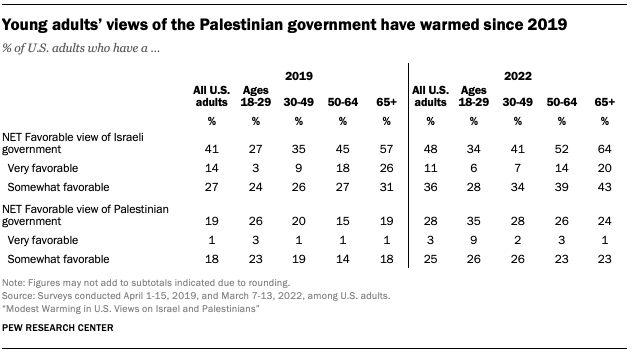
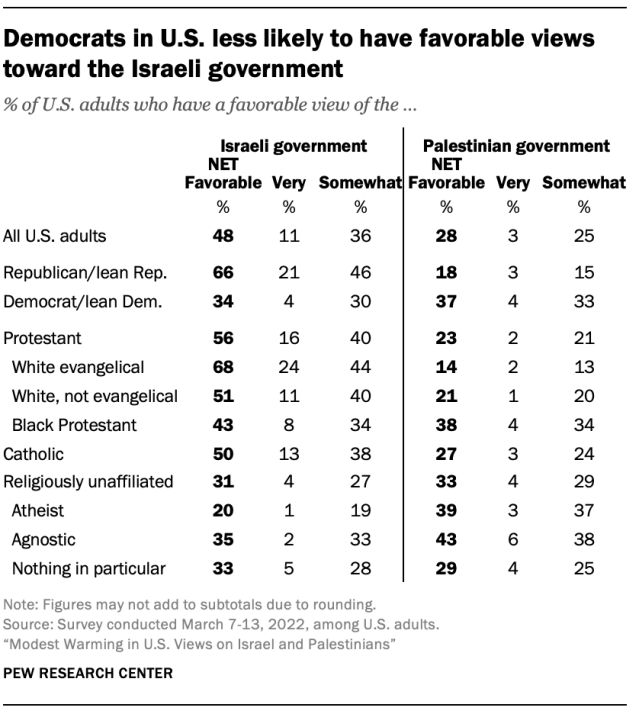
White evangelical Protestants are the religious group most likely to express a very or somewhat favorable view of the Israeli government (68%). Much lower shares of Catholics (50%), White Protestants who are not evangelical (51%), Black Protestants (43%), and religiously unaffiliated people, sometimes called “nones,” (31%) say the same. Atheists (a subgroup of the “nones”) are more likely to express a favorable view of the Palestinian government (39%) than of the Israeli government (20%).
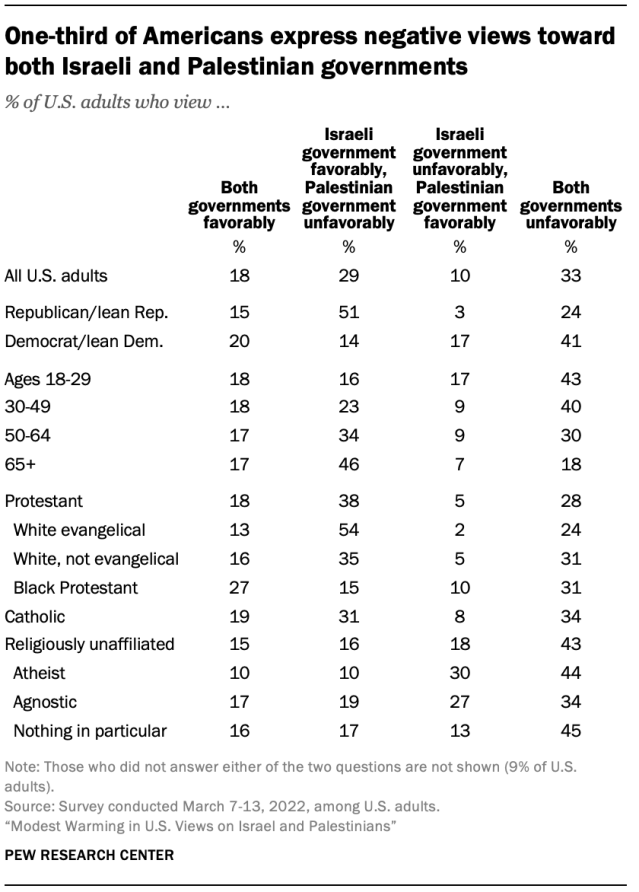
A third of Americans have an unfavorable view of both the Israeli and Palestinian governments, while three-in-ten (29%) view the Israeli government favorably and the Palestinian government unfavorably.
About half of Republicans (51%) view the Israeli government favorably and the Palestinian government unfavorably, while roughly four-in-ten Democrats (41%) view both governments negatively.
Young adults are less inclined than their elders to view the Israeli government favorably and the Palestinian government unfavorably. Adults under 30 are also much more likely than those ages 65 and older to view both governments unfavorably (43% vs. 18%).
What is the best outcome of the conflict between Israel and the Palestinians?
For nearly three decades, successive U.S. administrations have backed, at least in principle, negotiations between Israel and the Palestinians toward a two-state solution along the lines envisioned in the 1993 Oslo Accords. However, a long impasse has led some U.S. officials, as well as some Israelis and Palestinians, to warn that the vision of two independent states coexisting is in danger of collapse. For this reason, the survey included a new question asking Americans which of several broad alternatives they would consider to be the best outcome of the conflict.
About a third of U.S. adults (35%) say the best possible outcome would be that “the land is split into two countries, one with an Israeli government and one with a Palestinian government.” A similar share (37%) say they are unsure what the best outcome would be, while fully one-quarter say the best solution would be one country – either “governed jointly by Israelis and Palestinians” (16%) or “with an Israeli government” (10%). Just 2% say the best outcome would be one country “with a Palestinian government.”
Roughly equal shares of Republicans and Democrats (including those who lean to each party) favor a two-state solution, saying the best solution is to split the land into two countries with separate governments (34% and 36%, respectively). But Republicans (18%) are far more likely than Democrats (3%) to say the best outcome would be one country with an Israeli government. And Democrats (19%) are slightly more likely than Republicans (13%) to favor an outcome in which a single country would be jointly governed by Israelis and Palestinians.
About four-in-ten Catholics (42%), atheists (43%) and agnostics (40%) say the best outcome is splitting the land into two countries, one with an Israeli government and one with a Palestinian government share this view.
At the opposite end of the spectrum, White evangelical Protestants are the most likely to say that the best possible outcome is one country (39%), including 28% who say that the best solution would be a single country with an Israeli government. By contrast, just 6% of other Protestants and Catholics take that position.
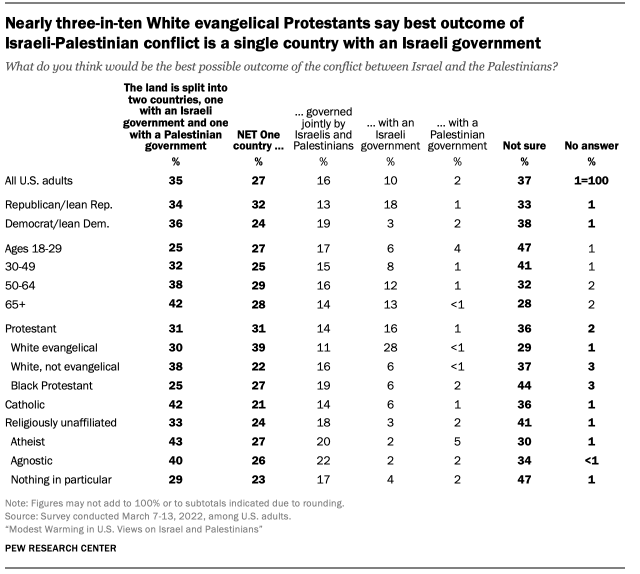
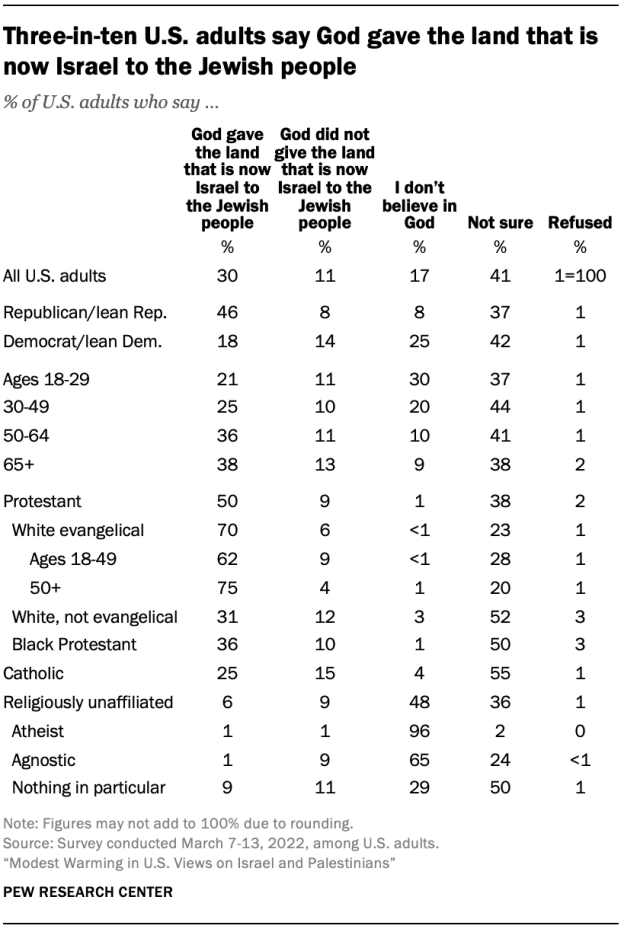
Some Americans’ views toward Israel may be tied to their religious beliefs. Indeed, 30% of all U.S. adults say God gave the land that is now Israel to the Jewish people, similar to the share of Jewish Americans who expressed this view in 2020.1 Others say that God did not give the land that is now Israel to the Jewish people (11%); that they do not believe in God (17%); or that they are not sure how to answer the question (41%).2
Republicans are far more likely than Democrats to say that God gave the land that is now Israel to the Jewish people (46% vs. 18%). (Previous surveys also have found that Democrats are less likely than Republicans to believe in God.)
White evangelical Protestants are the U.S. religious group most inclined to say God gave the land that is now Israel to the Jewish people. A solid majority of White evangelicals (70%) take this position, compared with a minority of Black Protestants (36%), White non-evangelical Protestants (31%) and Catholics (25%). Among White evangelicals, those ages 50 and older are especially likely to hold this view.
Among all survey respondents who believe God gave Israel to the Jewish people, a quarter (25%) say the best outcome of the Israeli-Palestinian conflict would be a single country with an Israeli government – well above the 10% of all U.S. adults who favor this outcome.
Among U.S. adults, little familiarity with – or support for – the BDS movement
Relatively few Americans have heard “a lot” (3%) or “some” (12%) about the boycott, divestment and sanctions (BDS) movement against Israel. Three-in-ten say they have not heard much (31%) about it, and 53% have heard nothing at all about the movement. These patterns hold across political parties and religious groups, although U.S. Jews are much more familiar with BDS.
The BDS movement, launched by Palestinian groups in 2005, alleges that “Israel is occupying and colonizing Palestinian land, discriminating against Palestinian citizens of Israel and denying Palestinian refugees the right to return to their homes.” It describes its mission as working “to end international support for Israel’s oppression of Palestinians and pressure Israel to comply with international law” by calling for boycotts of Israeli companies and sporting, cultural and academic institutions. Critics of BDS, including the U.S. government under President Donald Trump and the Anti-Defamation League, have called the movement antisemitic.
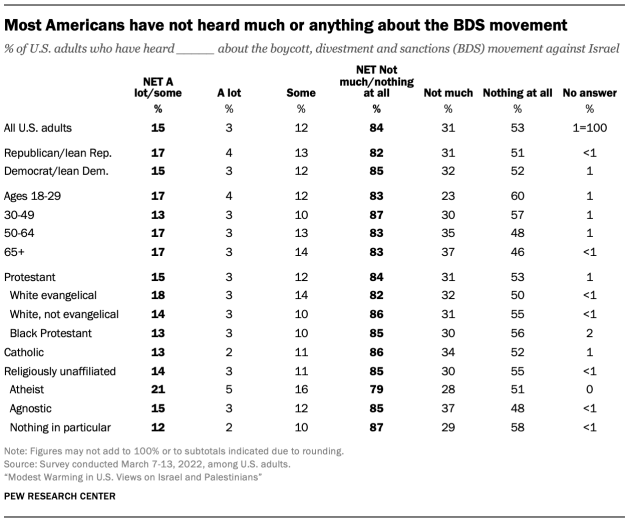
Respondents who said they have heard at least “some” about the BDS movement were asked a follow-up question about whether they support or oppose it. Overall, 5% of U.S. adults say they support BDS at least “somewhat,” including 2% who “strongly” support it. An additional 3% neither support nor oppose the movement, while 6% are opposed to it, including 5% who “strongly” oppose it. The vast majority of the public (84%) has not heard much, if anything, about BDS and, therefore, was not asked whether they support or oppose it.
Atheists are especially likely to say they support the BDS movement (13%, 2% oppose), although most atheists – like Americans in general – have not heard much, if anything, about it (79%). Conversely, about one-in-ten White evangelical Protestants (11%) and Republicans (12%) oppose the BDS movement against Israel, while no more than 2% of people in these groups support it.
BDS has gained some attention for its activity on college campuses, and adults under 30 are slightly more likely than older Americans to say they support the movement – though roughly eight-in-ten have not heard much about it.
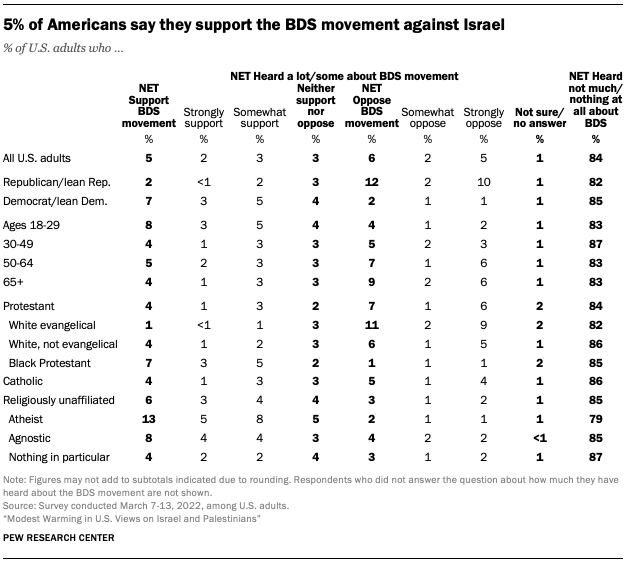


אין תגובות:
הוסף רשומת תגובה